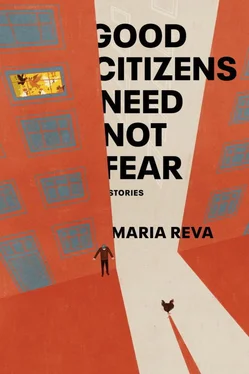Maria Reva - Good Citizens Need Not Fear - Stories
Здесь есть возможность читать онлайн «Maria Reva - Good Citizens Need Not Fear - Stories» весь текст электронной книги совершенно бесплатно (целиком полную версию без сокращений). В некоторых случаях можно слушать аудио, скачать через торрент в формате fb2 и присутствует краткое содержание. Город: New York, Год выпуска: 2020, ISBN: 2020, Издательство: Doubleday, Жанр: Современная проза, humor_satire, на английском языке. Описание произведения, (предисловие) а так же отзывы посетителей доступны на портале библиотеки ЛибКат.
- Название:Good Citizens Need Not Fear: Stories
- Автор:
- Издательство:Doubleday
- Жанр:
- Год:2020
- Город:New York
- ISBN:978-0-38554-529-7
- Рейтинг книги:3 / 5. Голосов: 1
-
Избранное:Добавить в избранное
- Отзывы:
-
Ваша оценка:
- 60
- 1
- 2
- 3
- 4
- 5
Good Citizens Need Not Fear: Stories: краткое содержание, описание и аннотация
Предлагаем к чтению аннотацию, описание, краткое содержание или предисловие (зависит от того, что написал сам автор книги «Good Citizens Need Not Fear: Stories»). Если вы не нашли необходимую информацию о книге — напишите в комментариях, мы постараемся отыскать её.
Good Citizens Need Not Fear: Stories — читать онлайн бесплатно полную книгу (весь текст) целиком
Ниже представлен текст книги, разбитый по страницам. Система сохранения места последней прочитанной страницы, позволяет с удобством читать онлайн бесплатно книгу «Good Citizens Need Not Fear: Stories», без необходимости каждый раз заново искать на чём Вы остановились. Поставьте закладку, и сможете в любой момент перейти на страницу, на которой закончили чтение.
Интервал:
Закладка:
Smena had recruited Milena because of her proximity to X-rays, but also for her proximity to Smena herself. Milena lived two doors down in a one-room she shared with her poet husband, and Smena didn’t even need to cross her own doorway to coax her neighbor in for a chat. From the first, Smena had known Milena would be perfect for the position; no one would suspect the pale middle-aged woman with drab clothes and uneven bangs of dealing illicit albums. At first Milena had refused, recounting how just last month she’d had to shake off a government lackey who had been trailing her husband, and was not sure she would be able to get rid of another, but after a second round of shots Milena confessed she could use the extra money. She was saving up—what for, she didn’t say.
Seated across the kitchen table from Smena was Larissa, the style hunter who supplied hits from the West. “Megadeth is a deliberate misspelling of the English word ‘megadeath,’ one million deaths by nuclear explosion,” she explained. Unlike Milena, who wore only black like a perpetual mourner, Larissa was a carefully choreographed explosion of color: red-and-yellow checkered dress, tangerine tights, peacock-blue heels (which she hadn’t taken off at the door). She sewed most of her clothes herself, copying styles from British and French magazines, complete with embroidered duplicates of the most prestigious logos. Thirty-one years old, Larissa lived with her mother and two daughters in the suite below Smena’s. From the fights Smena overheard through the heating vent—typical topics raised by the mother: Larissa’s low-paying job at the chemical plant two towns over, Larissa’s expensive tastes, Larissa’s failure to keep a man—Smena had gauged that her downstairs neighbor, like Milena, could not refuse a second income. It had only taken Smena two nights of thumping her floor with a broom handle before an irate Larissa paid her first visit.
Smena closed her eyes, taking in Megadeth’s restless rhythms. She couldn’t understand the lyrics, of course, but the singers’ screams were so wrenching, they seemed to be dredging up bits of Smena’s own soul. She wondered how Megadeth would sound at full volume, the power of the screams unharnessed.
“I think there’s something to this,” she said.
Milena’s and Larissa’s eyes swiveled to her in surprise.
Smena glared at the women in return. “Oh, come off it. I’m old but I’m not obsolete.”
“The group’s aesthetic is contextual. People scream a lot in America,” offered Larissa, adjusting her horn-rimmed lensless glasses. “They have screaming therapy for terminal patients. Very expensive. I read about it. Doctors drop patients off in the middle of the woods and get them to hurl their lungs out. Barbaric, yes, but most come back happier.”
“The last time I made a person scream they didn’t seem any happier,” Milena remarked with a smirk, “and I did it for free.” Smena nodded without comment, assuming Milena was referring to one of her fencing tournaments.
When the meeting ended and Milena left, Smena found herself alone with Larissa as she gathered her effects into a quilted faux-leather purse. Smena leaned across the table toward the woman and stretched her lips over her teeth into a smile. This felt awkward, so she unstretched them. “You’re doing a fine job, Larissa.”
Larissa simply nodded, without deflecting the compliment. Another of her imports from the West: a lack of modesty.
Smena produced two bills from her pocket. She did not look at the money as she slipped it into Larissa’s breast pocket. She wanted the action of touching money to look easy, as if it was something she did a lot, something she barely noticed anymore. “I hear the bakery by the chemical plant is better than the one around the block. Mind picking up a loaf sometime this week?” she said. And added, “Keep the change.”
A child’s whining cry reached them from the suite below. Larissa gave a weary smile. “I’d be happy to.”
“And a dozen eggs, if you see them.”
“At the bakery?”
Smena slid a few more bills across the table, many more than necessary.
“Brown or white?” asked Larissa.
“White bread, brown eggs.” The pricier options.
Smena had asked Milena to bring potatoes two weeks prior. If Milena and Larissa picked up an item or two of food for her every now and then, with her small appetite she would be fine. She did not want her neighbors to suspect that, combined, they were part of a greater pattern. She hadn’t been to the bazaar in over a year, hadn’t even ventured past her front door. Each time Smena opened the door, she felt the dank air of the outer hallway cling to her skin, as if she were being pulled into a tomb.
Smena’s fears had begun with a newspaper article: a boy had tripped over exposed rebar and broken both wrists. For years, the townspeople had been privately griping about the poor state of roads, sidewalks, bridges, but this was the first time the consequences of decaying infrastructure were publicized. Soon more and more reports came, from all over the country, each more outlandish than the next. A sinkhole trapped a commuter bus. A family of five plummeted to their deaths in an elevator malfunction. A gas leak gently poisoned preschoolers for weeks before being discovered. Pedestrians were advised to avoid underpasses.
Even previously privileged information was released, about how the town had been built on a not-quite-drained marsh that was slowly reliquifying. Smena’s daughter, and her daughter’s university friends, had cheered on the liberation of the press, which was taking place in their respective towns, too. But Smena had felt safer under the maternal hand of censorship.
Smena’s building, her entire town, now felt like a death trap, but she convinced herself that the concrete walls of her own apartment were secure. After a yearlong renovation, none of the windows or doors creaked. The new checkerboard linoleum felt smooth and sturdy under her feet. As long as she stayed in her space, twelve by twelve steps, she would be safe.
The X-ray of Nika’s skull lay on the kitchen table. Smena admired its smooth round shape. No matter how penetrating the radiology waves, the thoughts and desires within that doomed chamber remained secret. There Nika lived, and there she would die.
Smena felt no pity. Pity masked itself as kindness, but was rooted in condescension. Smena would not want to be pitied herself.
She turned Megadeth back on. Screaming therapy, she thought. Now there’s something useful.
She lit a cigarette, and paused to appreciate the scratchy vocals and pulse-raising tempo before hitting Stop, resetting the needle to the beginning. Using manicure scissors, Smena cut the radiograph into a circular shape. She made a hole in the middle of the circle with her lit cigarette, right where the ear would be, and the acrid smell of burning plastic rose from the film. She positioned the film on the phonograph, attached a spidery metal arm from the record player’s needle to the cutting stylus on the phonograph, and hit Play on both machines. As the grooves on the vinyl vibrated the needle and produced music, the metal arm transmitted the vibrations to the cutting stylus and reproduced the grooves onto Nika’s skull.
The evening before the next meeting, Larissa’s eleven-year-old daughter knocked on Smena’s door. Given Larissa’s talent for fashioning replicas, Smena found it fitting that Dasha should look just like her wide-eyed mother—down to the cowlick, and the platoon of bobby pins enlisted to flatten it. The girl informed Smena that her mother couldn’t make it to their biweekly study session on dialectical materialism—Smena couldn’t help smiling—because her mother was so sick with the flu she couldn’t crawl up two flights of stairs to tell Smena Timofeevna so herself.
Читать дальшеИнтервал:
Закладка:
Похожие книги на «Good Citizens Need Not Fear: Stories»
Представляем Вашему вниманию похожие книги на «Good Citizens Need Not Fear: Stories» списком для выбора. Мы отобрали схожую по названию и смыслу литературу в надежде предоставить читателям больше вариантов отыскать новые, интересные, ещё непрочитанные произведения.
Обсуждение, отзывы о книге «Good Citizens Need Not Fear: Stories» и просто собственные мнения читателей. Оставьте ваши комментарии, напишите, что Вы думаете о произведении, его смысле или главных героях. Укажите что конкретно понравилось, а что нет, и почему Вы так считаете.












